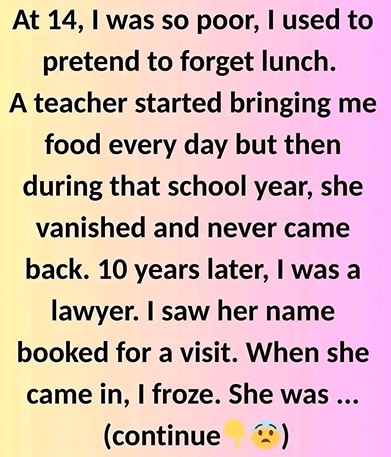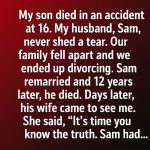I was fourteen when I learned that hunger could feel like shame.
At school, lunchtime was the loudest part of the day. Kids unwrapped sandwiches from crinkling foil, dug into thermoses, traded juice boxes like they were playing cards. The cafeteria buzzed with laughter, smells of pizza slices and peanut butter wafting through the air.
And then there was me.
I’d slide into my seat, press my stomach against the edge of the table, and shrug when someone asked, “Where’s your lunch today?”
“Oh,” I’d say lightly, forcing a grin. “Forgot it at home.”
Every day? How many times could someone “forget” their lunch? But kids didn’t notice. They were too busy trading cookies. Teachers didn’t notice either. Or so I thought.
The truth was simple and brutal: my family couldn’t afford it. Dad’s hours had been cut at the plant, and Mom worked double shifts at the diner just to keep the lights on. By the time she dragged herself home after midnight, the last thing on her mind was packing lunches. I learned to swallow my hunger as if it were another subject on my schedule.
One Wednesday, as I sat pretending to be absorbed in my math book, I noticed a shadow fall across my table.
“Hungry?” a voice asked softly.
I looked up. It was Mrs. Lawson, my English teacher. She was holding out a brown paper bag.
I flushed. “Oh—I’m fine.”
She didn’t push, didn’t scold, didn’t make a scene. She just set the bag in front of me and said, “You forgot it again, right? Lucky I had an extra.” Then she winked and walked away.
Inside was a turkey sandwich, an apple, and a granola bar.
The next day, it happened again. And again the day after that. Always the same—she’d hand me a bag, make a little joke about “extras,” and move on like it was nothing. She never once called attention to it in front of others. She never asked about my family. She never made me feel like charity.
To me, she wasn’t just a teacher. She was a lifeline.
And then one day, she was gone.
No explanation, no goodbye. Another teacher filled in for her classes. Rumors swirled—something about her family, her health, no one knew. I waited, hoping she’d reappear with one of those little brown bags. But she never did.
I carried that emptiness with me.
Years passed. I worked my way through high school, through college, clawing for scholarships, working part-time jobs until my hands ached. Some nights I went to bed so tired I cried. But I remembered those lunches. That simple, quiet kindness.
It wasn’t the food that kept me going—it was the dignity she gave me. She saw me when I was invisible.
By the time I was 24, I had done something I once thought impossible. I passed the bar exam. I became a lawyer.
I hung my name on the door of a modest office downtown. Nothing fancy—just my desk, two chairs, and shelves stacked with law books I couldn’t believe were mine. Every day I promised myself: I’ll use this to help people who feel small, overlooked, powerless.
Then one morning, while glancing through my list of appointments, my heart stopped.
There it was. A name I hadn’t seen in ten years.
Lawson.
I sat frozen, my hand hovering over the paper. Could it be?
The door creaked open at noon, and time bent in on itself.
She stepped in—her hair now streaked with silver, her eyes still warm but shadowed with exhaustion. I knew those eyes instantly.
“Mrs. Lawson?” I whispered, rising from my chair.
She blinked at me, confused. “Yes… I’m sorry, have we met?”
“It’s me,” I said, my throat tightening. “You used to teach English. You—” My voice cracked. “You used to bring me lunch.”
Her hand flew to her mouth. “My goodness. You’re—”
“A student you probably don’t even remember,” I said quickly.
But tears welled in her eyes. “I remember. I always wondered what became of you.”
I gestured for her to sit, my chest aching at how small she looked in that chair. She explained her situation. Her husband had left, draining their joint account. She had nothing. The bills were piling up, and she was desperate.
“I… I know lawyers are expensive,” she said softly, twisting her hands. “But if there’s any way you might consider—maybe a reduced fee—”
“Stop,” I said firmly. “You won’t pay me a cent.”
She shook her head. “I couldn’t ask—”
“You didn’t ask,” I interrupted gently. “But you once gave me more than you know. Now, it’s my turn.”
I took her case personally. Sleepless nights, mountains of paperwork—I poured every ounce of myself into it. In court, I stood taller than I ever had, fueled not just by law, but by gratitude.
And we won.
The judge ruled in her favor. Every cent that had been taken was returned to her—plus damages.
When the gavel struck, she gasped, tears spilling down her face. She threw her arms around me, shaking. “You saved me,” she whispered.
I held her tightly. “No,” I said softly. “You saved me first. This is just me returning the kindness you showed me when I had nothing.”
She pulled back, her eyes wide with recognition.
“You fed me when I was invisible,” I said. “And now, you can count on me—always.”
For the first time in years, she smiled—really smiled.
And in that moment, the circle closed.


